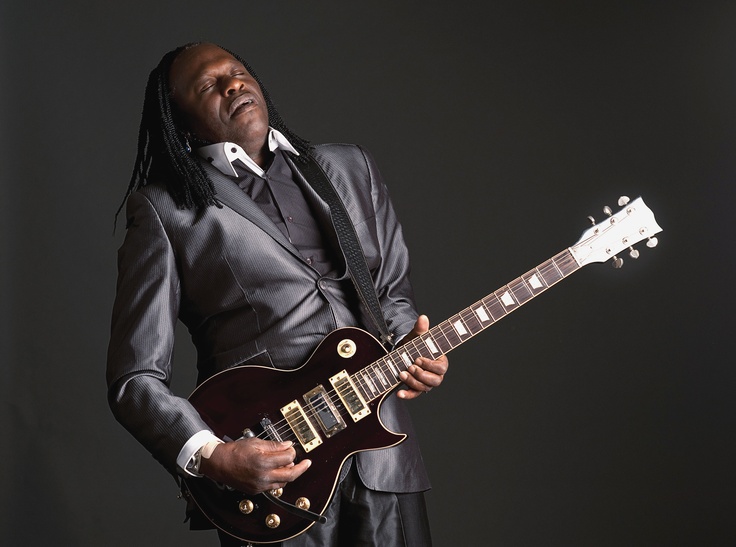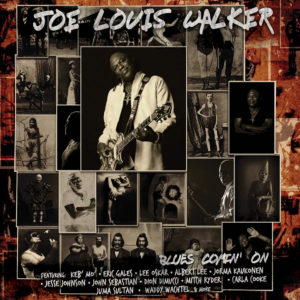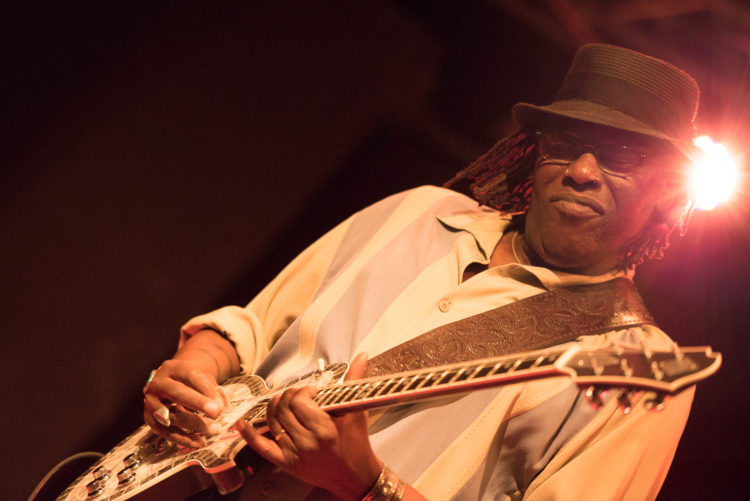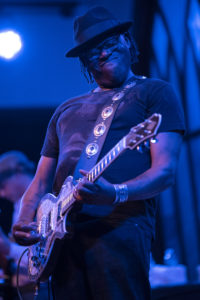
For decades, San Francisco has been the home to some of the most successful, eclectic and influential musical artists and groups. Starting with the ‘Flower Power’ era of the late 1960s, artists of many different milieu and genre gravitated to the city by the bay to partake in the so called counterculture, which revolutionized almost every aspect of pop culture, from music, to art, film and fashion.
There was always an element of the San Fran music scene that appreciated originators, whether they be the homegrown progenitors of the acid rock movement, such as The Grateful Dead or Jefferson Airplane, or those who came before, carving out their own styles of music, such as the blues greats of the 1940s and 1950s, many of whom found an interested and appreciative audience in the northern California climes.
Veteran blues musician/vocalist/songwriter Joe Louis Walker was raised in this hothouse of creative exploration and reverence, becoming know as much for his willingness to paint outside the established musical lines, as he was for his ability to channel the best of the traditional blues feel and emotional eloquence.
Starting as a session player and sideman, he began releasing his own music in the mid-1980s, carving out a reputation for his versatility, his authenticity and his prodigious output. His latest album Blues Comin’ On, was released through Cleopatra Records earlier this summer, and sees Walker inviting a veritable who’s who of the music industry to participate in this energizing and entertaining musical endeavour.
The guests include legendary 1950s teen idol Dion, long-time Jefferson Airplane/Starship guitarist Jorma Kaukonen, Detroit legend Mitch Ryder, The Lovin’ Spoonful’s John Sebastian, Waddy Wachtel (Linda Ronstadt, Keith Richards, Jackson Browne et al.) and many more.
Although written and recorded well before the current Covid-19 crisis, the album is a wonderful antidote to the negativity and stress created by this extraordinary event. In that context Walker talked about the importance of music as a tonic or a salve during tough times – especially under the current context of a worldwide pandemic that has caused epic economic and social dislocation.
 “I know I am trying to stay positive and hoping for the best. I understand that all of us are having to adapt and adjust. This situation is borderline Biblical. It’s something that none of us ever expected and none of us really know how to deal with. It’s really weird: we really don’t know how we got here, and we also don’t know how we’re going to get out of it. It’s pretty daunting,” he said.
“I know I am trying to stay positive and hoping for the best. I understand that all of us are having to adapt and adjust. This situation is borderline Biblical. It’s something that none of us ever expected and none of us really know how to deal with. It’s really weird: we really don’t know how we got here, and we also don’t know how we’re going to get out of it. It’s pretty daunting,” he said.
“And the music on this album, I hope that it can be, I won’t say a distraction, but something that can spread a little bit of light in a lot of darkness. I think what you said about music is pretty smart. When you have these tribulations and upheavals, music is the soundtrack to all that, whether it’s social upheaval or some sort of medical situation or some sort of political situation, music has always been a big part of that. Music is immediate; music is one of those amazing things where it’s direct from one person’s soul out to other people’s souls. And invariably what happens, I believe, and what makes a musician or an artist or a songwriter so effective, is they connect with a bunch of other people who are feeling the same thing. Right now, in the middle of 2020, a lot of people are feeling the same thing, and that one thing is the fear of the unknown. Fear – you can listen to it, you can hear it and see it and feel it in every aspect of our lives, you hear it from the people on television, there’s a little bit of fear in everyone’s voices. We are really in a situation where it would be nice if everybody really, really considered being their brother and sister’s keeper, okay, and doing what we know medically works.
“But for some reason, it seems like it’s extremely hard for people to do, and that’s why I think musicians tap into things that a lot of other people don’t because musicians have a tendency to travel all around and meet people from all around. They see the effects of what happens when people get together and what happens when people aren’t together. And from the stage you can see people enjoying the same things, people of all colours, races, sexual preferences, religions, you can see them right in front of you enjoying the same experience. They might not have anything in common when they walked through the door, but when they walk out at the end of the show, they have something in common. And that’s what music does. With artists, it does break your, all the good music that we all enjoy, that has touched us all. Just think of any song and it can brighten your day. I was just thinking of Three Little Birds by Bob Marley the other day, and how people like to wake up in the morning to the sound of birds. I have birds outside my home and when they sing, I sing with them, and they answer me, and it just makes my day. It makes me feel good, until I’ve got to jump back into the reality of what’s going on in the world. So, music can be a healer, as John Lee Hooker said, but we also need to help each other, and I keep hoping that we will.”
One special element of Blues Comin’ On, both for Walker and for listeners, is the fact that he opened himself up to a broad ranger of collaborators, both writing wise, and especially as guest musicians and vocalists on the album.

“I think this is my 27th album since 1985 and I have had only three with guests. The first one was called Great Guitars [1997] and it had a lot of my heroes on it. I wrote songs for my heroes and they agreed to do it, so there’s Buddy Guy, Bonnie Raitt, Otis Rush, Scotty Moore from Elvis’ band, Matt ‘Guitar’ Murphy, Robert Lockwood and so that was cool. I did another one, a live one with Johnny Winter and a number of other guys on it too [Joe Louis Walker Blues Conspiracy: Live on the Legendary Rhythm & Blues Cruise, 2010]. This new one I wanted to do because I am at a point in my life where I am sort of looking back on things. Yes, I am still looking forward, but I am looking at what inspired me. And what inspired me was growing up with the music of the San Francisco Bay area, playing at the Fillmore Auditorium and all that, and the mishmash of all the bands that came out of here. On one bill you could have The Grateful Dead, Bo Diddley and the Charles Lloyd Quartet. There would be another bill with Jefferson Airplane with my friend Jorma on guitar, Howlin’ Wolf and The Buddy Rich Orchestra. It was all mixed up. The music that comes out of me, comes out of my experiences, it comes out of people I have collaborated with. And I collaborate with people because I think it takes you out of your wheelhouse. It brings out something in you that it normally wouldn’t, and I think it brings out something in the other person that it normally wouldn’t. I am extremely happy to be able to collaborate with people that I respect and people who just have so much talent,” he explained.
“So, I wanted to drop another album that sort of reflected what I came out of, what inspired me and what informed me as a musician. And Cleopatra Records afforded me the chance to do it, so I just made a wish list and most of the people agreed to do it, so here we are. On Blues Comin’ On, about three-quarters of the people I already knew. I knew Dion, I knew John Sebastian of the Lovin’ Spoonful, I knew Juma Sultan, who played with Jimi Hendrix at Woodstock, I knew Arlen Roth and Keb Mo, I knew Jellybean Johnson and Albert Lee. When you’ve been playing as long as I have, you’re going to do a lot of shows with some of these people. Had I played with all of them? No, but most of the ones I named, I asked and the ones that I didn’t play with, I played on their records. I played on a Mitch Ryder record, I played on Dion’s new record – me, him and Van Morrison do a trio. So, I had a connection with a majority of these people.
“And some of it was people that I really respected and wanted to work with, and those who agreed to do it turned out to be fantastic. Someone like Waddy Wachtel was incredible. I am one of those guys where I love the people who are behind the scenes, they are just as good as the people out front. So, working with someone like Waddy was a Godsend because whenever I had a problem making this record, sonically or music wise or musician wise, if Waddy wasn’t busy, I could call him, and he would help me out. And you can trust someone like that because he doesn’t have an agenda. He just said, ‘I want you to sound good man, but I am also going to tell you the truth, so do what you want with it.’ You don’t want somebody that is just going to be a yes man, and I respect that kind of approach. You have to be able to not only hear the truth but accept the truth.”
A true revelation for the uninitiated is the powerful and evocative vocal performances by Carla Cooke, daughter of the legendary soul/R&B icon Sam Cooke. She appears on the brilliant Someday, Someday, and the exceptional Wake Me, Shake Me.
 “I think if there was a star of this record that really makes this whole thing work, it’s Carla Cooke as well as Waddy. I very rarely say this but for the life of me, I can’t figure out why Carla Cooke is not a household name in the way that Natalie Cole is. She is extremely talented, and she has a voice that, once you hear it, you never forget it,” he said.
“I think if there was a star of this record that really makes this whole thing work, it’s Carla Cooke as well as Waddy. I very rarely say this but for the life of me, I can’t figure out why Carla Cooke is not a household name in the way that Natalie Cole is. She is extremely talented, and she has a voice that, once you hear it, you never forget it,” he said.
Blues Comin’ On is, quite obviously a blues album. But within the very broad definition of that musical genre, it is evident that Walker feels unfettered by anyone else’s idea of what ‘the Blues’ is, which makes the album an incredibly diverse and dynamic exploration of the boundaries of a genre that some purists get quite sniffy about when artists attempt to deviate from the ‘formula’. Walker has enough miles under his belt, enough experience and accolades and a pedigree that speaks for himself to never allow other people’s viewpoints to colour his creativity.
“First of all, when I make a record, I make a record that I think I’m going to like, and I hope that people that like someone who is adventurous and an artist who is always pushing themselves can also hear that. If you listen to my first album [Cold Is The Night, 1986] all the way up to this one, and you consider all the people I have played with, I have always been this way. I am as comfortable playing guitar with Scotty Moore and D.J. Fontana from Elvis Presley’s band as I was playing with B.B. King on one of his records. I am as comfortable playing with [Rolling Stones, Faces] Ronnie Wood, who I’ve known for 33 years, as I am playing with Robert Cray. I am as comfortable singing with Dion [as he does on this record with the title track, Blues Comin’ On] who was a pop idol, as I am singing with Nick Lowe and Paula Carrack and Huey Lewis and Carla Cooke, as I am with John Lee Hooker,” he said, as he began to outline some of his background and the interesting musical chemistry that contributed to Walker’s own style and approach to music.
“I started out at 16, 17, 18 playing with all the big Blues guys like John Lee Hooker, James Cotton and people like that. But over the years, I realize it’s all music to me. I am known for the blues. But I do find that any musician that I like steeped in the blues, like B.B. King, who I knew all my life, I know that B.B. was considered to be, quote unquote, a blues artist and could only sell to the blues people. He wasn’t meant to be for people like you. When he toured the world with U2 and made a record called When Love Comes to Town [Off the band’s 1990 album Rattle & Hum] it wasn’t blues, it was just a record. So, in the context of what is blues and what is not blues, when you hear When Love Comes to Town, if you heard B.B. King, you heard the blues. The form of the song was basically the same chords as Gloria by Them [Van Morrison’s band] and those chords had been used for 100 years. So, in essence, blues is everything and blues has been everything. But when it starts to get categorized to me, when you put it in that vibe, it’s to program people’s minds.
“Every blues guy that I ever played with, some of my mentors and amazing songwriters like Willie Dixon always told me, ‘Joe, make your music inclusive. Don’t try to be like Elmore James in 1952, be yourself. You doing a bad version of yourself is better than you doing a good version of someone else.’ So, when you hear me playing with Mitch Ryder, he was known for rock and roil. Then you hear me playing with Charlie Harper of the UK Subs; Charlie Harper was a Punk rocker in England when I was living there. I am also playing with Jesse Johnson, who isn’t know for the blues, Jesse Johnson was part of Prince’s New Power Generation. When you hear it all together, you can pick out blues notes and the blues vibe. 7&7 Is, the last song on this album, is about as far from blues as you can get. But music to me is all those things, it’s the root of so much of the music and the genres we have today. So much of blues is considered in a narrow way, which makes it exclusive. And all that exclusive stuff is equated with guys like me because I am perceived to be a blues guy, and yeah, I am in the Blues Hall of Fame, but I like to play it all, and I have played it all.”
For more information on Blues Comin’ On, Joe Louis Walker and any post-pandemic shows, visit www.joelouiswalker.com, or www.facebook.com/joelouiswalker.
- Jim Barber is a veteran award-winning journalist and author based in Napanee, ON, who has been writing about music and musicians for close to 30 years. Besides his journalistic endeavours, he now works as a communications and marketing specialist. Contact him at jimbarberwritingservices@gmail.com.
SHARE THIS POST:
